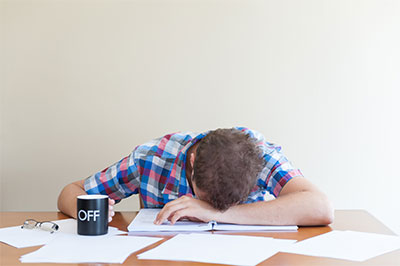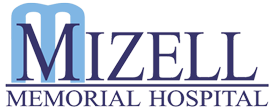702 North Main Street Opp, Al 36467
334-493-3541
Mizell Medical Clinics
Clinic 1 334-493-3240
Clinic 2 334-493-5555
Specialty Clinic 334-493-5704
Elba Healthcare 334-493-5713

A male is sitting at a desk and sleeping
Sleep Disorder Center
The Mizell Memorial Hospital Sleep Disorder Center is accredited by the American Academy of Sleep Medicine (AASM). The AASM accreditation demonstrates that the Mizell Memorial Hospital Sleep Center is committed to high quality, patient-centered care. Staff
The Mizell Memorial Hospital Sleep Disorder Center is staffed by three registered respiratory therapists and two registered sleep techs. Dr. Geoffrey Lipscomb is a board certified sleep specialist.Problems Sleeping?
Sleep is not merely "time out" from daily life. It is an active state essential for mental and physical restoration. More than 100 million Americans of all ages, however, regularly fail to get a good night's sleep.Sleep Center
Mizell Memorial Hospital's Sleep Disorders Center services are provided by professionals experienced in sleep-related disorders and sleep exacerbated diseases. It is supervised by a respiratory therapist, and is under the medical direction of our board-certified sleep specialist, Dr. Geoffrey LipscombThe Sleep Center is located on the 2nd floor of Mizell Memorial Hospital, equipped with state-of-the-art digital testing equipment for all aspects of sleep, and is fully accredited by the American Academy of Sleep Medicine, and approved by Blue Cross/Blue Shield, Medicare, and most other commercial insurances for sleep testing.
What to Expect at the Sleep Center
Before any sleep studies can be conducted, you must undergo an initial sleep evaluation. This evaluation usually consists of a physical exam and review of your medical history. Your physician will determine whether a sleep study is needed, then refer you to our sleep center. An appointment will be scheduled.During sleep testing, the activities that go on in your body during sleep (brain waves, muscle movements, eye movements, breathing through your mouth and nose, snoring, heart rate and leg movements) are monitored by discs (called electrodes) applied to your head and skin with adhesive. Flexible belts around your chest and abdomen measure your breathing. The level of oxygen in your blood is monitored by a clip on your index finger or earlobe. Your sleep may also be videotaped for later review of any abnormalities observed during the study. None of these devices are painful and all are designed to be as comfortable as possible. In the sleep center your surroundings (especially the bedroom) are homey and comfortable.
Basic Sleep Patterns
Sleep patterns vary from person to person. Most adults need seven to eight hours sleep, although some people need less than four and others more than ten. When an individual's sleep is adequate, that person should feel alert throughout the day.We can determine your sleep needs by measuring daytime alertness. Some people fall asleep when they should normally be able to stay awake. This could be very dangerous. Such abnormal sleep is a sign of several different sleep disorders and can be successfully treated.
Sleep patterns change with aging. Infants may sleep up to 16 hours a day, while the elderly may experience more disturbed sleep and greater need for naps. Daytime naps may disturb sleep for some people, but for others they are a normal part of a healthy sleep-wake pattern.
Sleep Disorder Checklist
Are you a loud habitual snorer?Do you feel tired and groggy upon awakening?
Are you often sleepy during waking hours?
Are you overweight and/or do you have a large neck?
Have you been observed to choke, gasp, or hold your breath during sleep?
Do you have early morning headaches upon arising?
Have you ever had black-outs while driving?
Do you have difficulty falling asleep?
Are you told that you kick or jerk during sleep?
Do you suffer from confusion or memory loss?
Have there been personality changes?
Are you often irritable?
Do you have a large neck size (> 16" in women; > 17" in men)?
Do you experience frequent urination at night?
Do you suffer from sexual dysfunction?
If you or someone close to you answered yes to any of the above questions, you should discuss your symptoms with your physician, or call the Mizell Memorial Hospital Sleep Disorder Center for further information at 1-334-493-3541 ext. 2101.
Sleep Disorders Diagnosed
SleeplessnessInsomnia - (The inability to fall asleep or remain asleep. This disorder can be caused by a variety of psychological and physiological conditions, including apnea, tension, or the misuse of sleeping pills.)
Restless Leg Syndrome - (A condition of extreme restlessness or deep crawling sensations in the legs while trying to sleep.)
Noctornal Mycoclonus - (A discorder in which sleep is interrupted by repeated twitches in the arms and/or legs.)
Sleep Apnea - (A condition in which breathing stops many times a night for periods of up to two minutes. Apnea is often characterized by loud snoring, sudden or frequent arousals and excessive daytime sleepiness. Symptoms and signs of sleep apnea are excessive daytime sleepiness, high blood pressure and heavy snoring. People with this disorder are often unaware they have it.)
Narcolepsy - (A disorder which causes a person to fall asleep suddenly, often at inappropriate times. Some narcoleptics also experience a sudden loss of muscle tone causing them to fall.)
Other Sleep-Related Disorders
Nightmares & Night Terrors - (Nightmares are frightening dream experiences which can later be recalled. These may occur at any age. Night terrors are often accompanied by an anguished scream, yet the victim seldom recalls the experience. Night terrors generally disappear after adolescence. The causes of nightmares and night terrors are unknown.)Bedwetting, Sleepwalking & Sleeptalking - (These disorders are common in childhood. Bedwetting is particularly common and, in most cases, the cause is unknown. Sleepwalking is also common in childhood and can be dangerous. Sleepwalkers should be protected by reducing the risk of falling and removing other dangers from the bedroom. Sleeptalking is also common. Sleeptalking is usually incomprehensible and rarely of psychological significance. It is important to determine whether the troublesome behavior is benign or a sign of sleep-related epileptic seizures.)
Work-Shift Change Syndrome - (People who keep irregular hours, such as shift workers, truck drivers and college students, may experience impaired concentration and performance along with physical symptoms due to abnormalities in their sleep-wake cycles.)
Delayed Sleep Phase - (A syndrome in which sleep onset and arousal times are later than desired. People with this disorder are usually able to conform to a conventional sleep-wake cycle.)
We're Here to Help
At Mizell Memorial Hospital Sleep Disorders Center, testing is provided overnight on an outpatient basis and admission to the Sleep Center for testing is by a physician's order only.You can expect
State-of-the-art equipment designed to record and help diagnose every type of sleep disorder.Registered respiratory therapist on staff.
Private bedroom for each patient and a centralized control room with staff in attendance for all-night on-line monitoring.
Bedrooms with minimal sounds and light.
Digital video monitoring using infrared and low light cameras.
Follow-up and referral treatment


